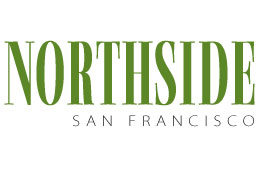 |
 |
|||||||
|
Food fights: From Tang to tacos By John Zipperer 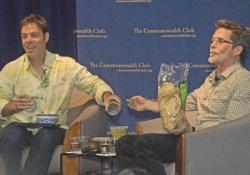 Joey Altman (left) shares chips and homemade
salsa with Rick Bayless photo: Sonya Abrams Why Tang? Why not some other faddish food or drink from the plastic seventies? Mary Roach, author of Packing for Mars: The Curious Science of Life in the Void, asked that Tang be served to attendees at her recent Commonwealth Club speech about interesting aspects of space travel. It was a nice change from the usual food program, in which the audience gets nothing to consume. Food programs are very popular with San Francisco audiences. Or more accurately, programs about food are very popular. I count myself as one of those who find these speakers and television programs fascinating, though in my household I’m at best a sous chef to the real cook of the house. In 2008, A Short History of the American Stomach author Frederick Kaufman told the Commonwealth Club “the more you watch the Food Network, the less you cook. In fact, most people who watch the Food Network are actually sitting there eating potato chips and drinking their soda.” You don’t even need to turn on the TV to understand the vicarious pleasure of talking about food. Two days before Mary Roach’s speech, chef Rick Bayless was interviewed at the Commonwealth Club by fellow chef Joey Altman. Altman kicked off the program by opening a bag of tortilla chips and serving some to Bayless along with salsa that Altman made using Bayless’s recipe. He got a passing grade. The audience didn’t even get any chips and salsa; apparently, watching two interesting people eat and talk about the food was enough for them. But Kaufman wasn’t necessarily criticizing people who enjoy learning about food. His real target was the American penchant for food fads. Crazy diets. Crazier diets to replace the crazy diets that didn’t work. Raw milk covens. He noted that fat, sugar and salt are all necessary elements humans need to survive, but they have become bogeymen in the food scene because of the tradition of bingeing on them. “Why do Americans always need to be told precisely how much of everything they should and should not eat?” he asked. That echoes another food-related speaker who argued that Americans fall for food fads and endless unworkable diets because there is no strong history of “food culture” in this country. Other countries, he said, don’t have that problem. That’s probably putting it too strongly. But there is something to the rootlessness with which many people search for a dietary regime, as if they’re looking as much for an identity as for weight loss or steady health. Two seemingly unrelated examples from our fair city have something to say about this. Earlier this year, the San Francisco supervisors attempted to outdo the Catholic Church and declare meatless Mondays, which frankly only served to remind me about taco Tuesdays when I was growing up. I prefer the latter, but to each his own. Then in September, local food critic Michael Bauer declared that the supervisors “seem intent on killing” San Francisco’s status as a “dining mecca.” The cause of his complaint is the board’s desire to add an alcohol surcharge to pay for city health-related expenses from dealing with the effects of alcohol abuse. I pair these two items because, well, talking about the San Francisco Board of Supervisors is fun. Better than watching the Food Network. But another reason is that they represent two different approaches to our food culture, or lack thereof. The meatless Mondays plan is the puritan side of American culture, attempting to get people to change their lifestyle to suit someone else’s desires. The alcohol tax – they’re calling it a fee, but it’s a tax – is arguably more about balancing the books than food morality. Whether it’s a good or bad tax may be up to San Franciscans to decide if the issue ends up on the ballot. But I doubt anything is about to kill San Francisco’s status as the West Coast food mecca. After all, those people who are watching the Food Network aren’t going to cook the food themselves, right? They’ll still get hungry and head to the fantastic local restaurants for which San Francisco is justly famous. Kaufman finds the roots of American food schizophrenia in our glorified Western history. When cowboys on the frontier got bored, he said, “sometimes they would partake in eating contests to keep themselves amused. What was a cowboy eating contest? You kill a cow, you get its intestines, and you roll them out. A cow intestine is probably 100 or 150 feet long. Then one cowboy takes one end, puts it in his mouth, and stands on one end of the prairie. The other cowboy puts the other end in his mouth, and whoever eats to the middle first, wins. I think that explains a lot.” From astronauts drinking Tang to cowboys having intestine-eating contests. Boys will be boys. John Zipperer is vice president of editorial and media at The Commonwealth Club of California, www.commonwealthclub.org. E-mail: johnz@northsidesf.com |
||||||||
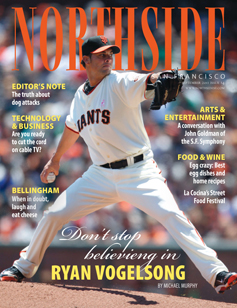 |
||||||||
|
||||||||
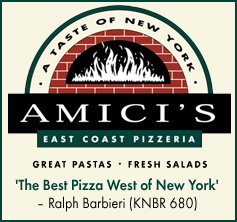
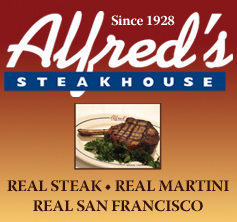  |
||||||||

